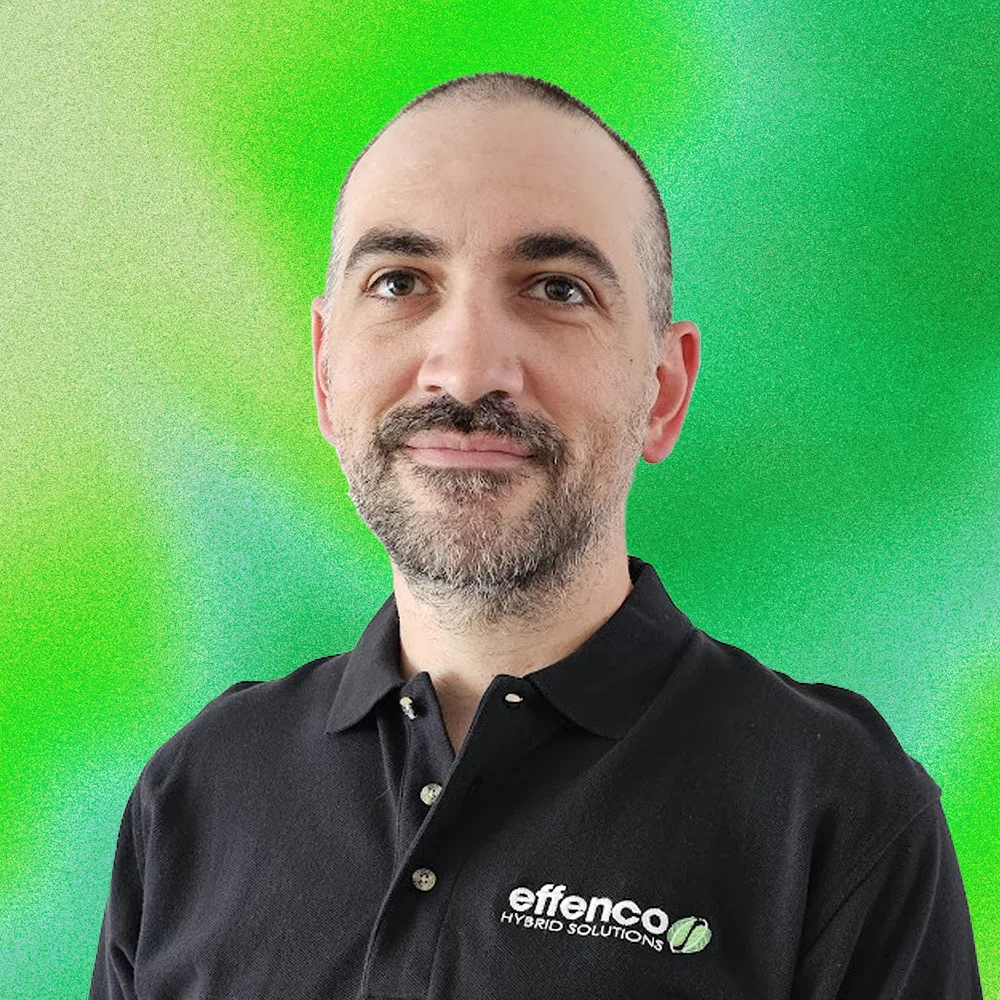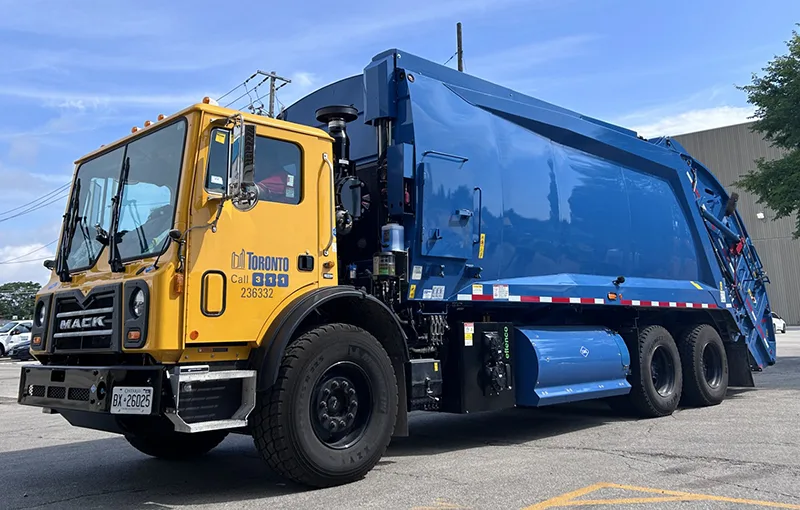How Effenco found a pathway to bring its novel technology to market

Through Mission from MaRS, the startup landed a unique contract with the City of Toronto as well as a parent company that could scale its singular way of electrifying vocational trucks.
The challenge
Effenco developed a singular way to electrify vocational trucks, but faced major roadblocks commercializing its tech.
The impact
The startup landed both a unique contract with the City of Toronto and a new parent company that could take its technology to the next level.
As engineering students in Montreal in the early 2000s, David Arsenault, Benoit Lacroix and Dany Fouquet were obsessed with race cars. Each year, they designed and built a new vehicle from scratch, entering it in the renowned Formula SAE competition. That obsession paid off, and multiple job offers from professional Formula One design shops rolled in.
But they had bigger ambitions. “Burning gas and going in circles was not really helping the world,” says Arsenault. Instead, they decided to apply their engineering expertise to another class of vehicle — medium- and heavy-duty trucks — and the far more urgent race to stop climate change.
Medium- and heavy-duty trucks are notorious polluters. According to the Pembina Institute, large vehicles make up 35 percent of emissions generated by the transportation sector. And while passenger vehicles are in the midst of a rapid electric evolution, the transformation of trucks has been slower and more complicated, largely because of battery limitations.
The trio formed Effenco in 2006 to solve this problem, focusing on the vocational truck segment (garbage trucks, cement mixers, terminal trucks, etc). The team zeroed in on a few key details: These vehicles start and stop frequently, and much of their work is done while the truck is immobile. They also don’t require the same amount of energy as other heavy-duty trucks, nor as consistent an energy supply. Over several years, Effenco designed an electric powertrain system that could take full advantage of this fact, using ultracapacitors, which can charge and release energy quickly to provide high-rate bursts of power. The technology cut engine hours by 50 percent, yielding fuel savings and GHG emissions reductions by almost 30 percent.
But then Effenco hit a speed bump. Money was tight and they couldn’t secure enough investment to scale. As well, the first systems they rolled out weren’t always reliable and needed constant maintenance. “Every day, every week, every month, felt like it could be the last one,” says François Rainville, Effenco’s first employee and their R&D director.

Over the next two years, the City of Toronto will be retrofitting 58 standard garbage trucks with a compressed natural gas (CNG) system that has been outfitted with the Effenco ultracapacitor technology.
Getting buy-in
Just as Effenco was navigating these challenges, however, MaRS invited the startup to participate in a new initiative, the Mission from MaRS: Climate Impact Challenge. Between February 2021 and June 2022, Effenco and nine other Canadian climate ventures were brought together with a curated coalition of industry advisors to address barriers to commercialization.
At the same time, MaRS was tackling the problem from the other end, helping corporations and municipalities to reach their net-zero goals. “It’s great to say, ‘I want to do this,” says Sue Talusan, director of MaRS’s Impact Accelerator. “But if you don’t actually have any of the tools at hand, you really can’t get started — especially governments.”
To that end, MaRS began discussions with the City of Toronto around streamlining its procurement process for cleantech technologies. Typically, competing suppliers submit quotes for specific goods or services, the City evaluates those according to certain criteria, selecting the one that best meets their needs. For one-of-a-kind technologies in high-impact areas such as climate, it didn’t make sense for the city to spend time vetting potential technologies when MaRS had already done that work.
MaRS proposed that the organization itself act as a kind of screening tool; if city staff were interested in adopting tech specifically developed by any of the 10 Climate Champions in the Mission from MaRS program, they could do so without going through the usual procurement process. MaRS’s reputation was vital to this unique arrangement, says Abi Thomas, the city’s general manager of fleet services: “There’s a level of trust and confidence with MaRS.” In December, 2021, City Council passed a motion approving the novel procurement pathway.
Finding a detour to market
Effenco continued to struggle. During the pandemic, it was challenging to convince original equipment manufacturers (OEMS) to integrate their technology into their supply chains. The company was running out of runway. But then the Mission from MaRS: Climate Impact Challenge provided yet another lifeline. In early 2022, one of its coalition members, Bruce Johnson, the executive vice president of innovation development at Martinrea International Inc., the global auto-parts supplier, visited Effenco’s offices. “I really liked the people,” he says. “I really liked the technology; I didn’t like the balance sheet.”
His timing was serendipitous; two weeks after that meeting, Effenco filed for bankruptcy. Later that year, Martinrea acquired the company’s assets. While Effenco the business had technically failed — it became a subsidiary of Martinrea — its technology would endure and, ultimately, reach a much larger market more quickly.
In 2024, the City of Toronto began piloting the Effenco solution on its existing garbage truck fleet. It continues to expand that pilot and, over the next two years, will retrofit a total of 58 vehicles — more than a quarter of the fleet. According to Abi Thomas, the city’s already seeing an annual GHG reduction of 26.64 tonnes (based on emission levels when the vehicles ran on diesel fuel).
As Canada moves toward the electrification of everything, what Effenco’s story illustrates is how we can’t do it alone. “This is not done in a vacuum,” Johnson says. “You need to do it as part of a team, part of a partnership. I think MaRS is an excellent partner: They learn new technology, they open doors, they help make sure they get the right people at the table, they understand problems. And they’re very committed and caring.”
Effenco
Founded: 2006
Programs: MaRS Mission from MaRS: Climate Impact Challenge
Services: Government relations, Investor and Industry connections, Business Advisory, Profile Amplification (previously part of Momentum program)
 Jason McBride
Jason McBride